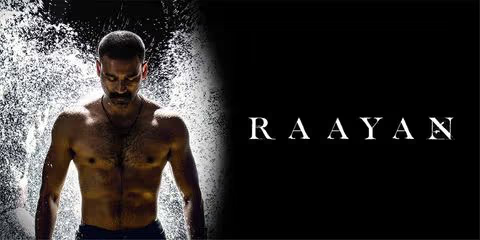Raayan Movie Review: A Cinematic Journey into the Heart of Emotions
Raayan, the latest sensation in Indian cinema, has captivated audiences with its intricate storytelling, stellar performances, and emotional depth. Directed by acclaimed filmmaker Aditya Singh, this movie delves into the complexities of human relationships, societal norms, and personal redemption. This review explores the various elements that make Raayan a must-watch film and a significant contribution to contemporary Indian cinema.
Plot Summary
Raayan centres around the life of Arjun, played by the versatile actor Rahul Sharma. Arjun is a man burdened by his past, trying to find solace and redemption in a world that seems unforgiving. The movie begins with Arjun’s release from prison after serving a sentence for a crime he did not commit. As he returns to his village, he faces the harsh reality of societal judgment and the struggle to rebuild his life.
The narrative takes a significant turn when Arjun meets Meera, portrayed by the talented Priya Singh. Meera, a school teacher with a mysterious past, becomes Arjun’s confidante and source of strength. Their evolving relationship forms the crux of the story, highlighting themes of trust, forgiveness, and love. The film beautifully captures their journey of overcoming personal demons and societal prejudices.
Performances
The performances in Raayan are nothing short of extraordinary. Rahul Sharma delivers a career-defining performance as Arjun. His portrayal of a man torn between guilt and the desire for redemption is both heart-wrenching and inspiring. Sharma’s nuanced acting, combined with his expressive eyes, brings Arjun’s character to life, making the audience empathize with his struggles and triumphs.
Priya Singh, as Meera, complements Sharma’s performance with her grace and intensity. Singh’s portrayal of a strong yet vulnerable woman adds depth to the story. Her chemistry with Sharma is palpable, making their relationship believable and relatable. Supporting actors, including veteran actor Anupam Kher as Arjun’s father and young actor Rohan Mehra as Arjun’s childhood friend, also deliver commendable performances, adding layers to the narrative.
Direction and Screenplay
Aditya Singh’s direction is a testament to his storytelling prowess. Singh masterfully weaves together the various narrative threads, creating a cohesive and engaging storyline. His attention to detail is evident in the film’s realistic portrayal of village life, the intricate character development, and the seamless transitions between past and present.
The screenplay, written by Anjali Deshmukh, is another highlight of Raayan. Deshmukh’s writing is both poetic and grounded, capturing the essence of the character’s emotions and the socio-cultural context. The dialogues are sharp and impactful, often leaving a lasting impression on the audience. The narrative structure, with its non-linear storytelling, adds intrigue and depth to the film.
Cinematography and Music
The cinematography by Ravi Verma is visually stunning, capturing the rustic beauty of the village and the emotional nuances of the characters. Verma’s use of natural light and wide-angle shots enhances the film’s aesthetic appeal, creating a visually immersive experience for the audience. The contrasting imagery of the serene village and the turbulent lives of the characters adds a layer of symbolism to the narrative.
The music by Ankit Tiwari is another standout aspect of Raayan. Tiwari’s soulful compositions and haunting melodies perfectly complement the film’s emotional tone. The songs, penned by lyricist Irshad Kamil, resonate with the themes of love, loss, and hope. The background score is subtle yet effective, heightening the emotional impact of key scenes.
Themes and Symbolism
Raayan explores several profound themes, making it more than just a conventional drama. The film delves into the concept of redemption, portraying Arjun’s journey from a state of despair to self-acceptance. It also addresses societal judgments and the stigmatization of individuals with a criminal record, shedding light on the challenges of reintegration into society.
The theme of forgiveness is central to the narrative, depicted through the evolving relationship between Arjun and Meera. Their bond symbolizes the healing power of love and understanding. The film also touches upon the theme of resilience, showcasing the characters’ ability to overcome adversity and rebuild their lives.
Symbolism plays a significant role in Raayan, with several visual and narrative elements enhancing the film’s thematic depth. For instance, the recurring motif of rain symbolizes cleansing and renewal, mirroring Arjun’s journey towards redemption. The village setting, with its lush landscapes and tranquil environment, contrasts with the characters’ internal turmoil, highlighting the dichotomy between appearance and reality.
Conclusion
Raayan is a cinematic masterpiece that stands out for its emotional depth, powerful performances, and impeccable direction. Aditya Singh’s vision and stellar performances by Rahul Sharma and Priya Singh make this film a compelling watch. The film’s exploration of themes like redemption, forgiveness, and resilience resonates with the audience, leaving a lasting impact.
Raayan is not just a film; it is an experience that takes the audience on a journey of self-discovery and emotional catharsis. It is a testament to the power of cinema to tell stories that matter, stories that reflect the human condition and inspire change. For anyone looking to witness a film that is both heartwarming and thought-provoking, Raayan is a must-watch.
In conclusion, Raayan is a shining example of contemporary Indian cinema at its best. It is a film that will be remembered for its storytelling, performances, and the emotional journey it offers. As the end credits roll, the audience is left with a sense of hope and a renewed belief in the power of love and redemption.







